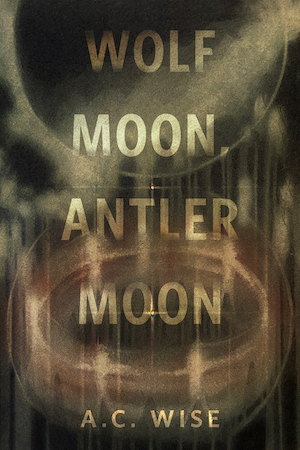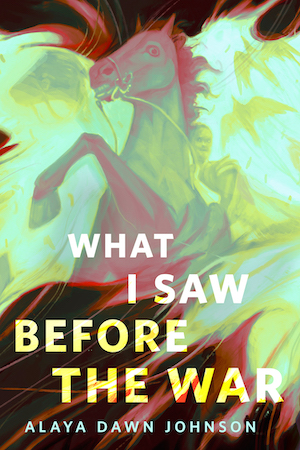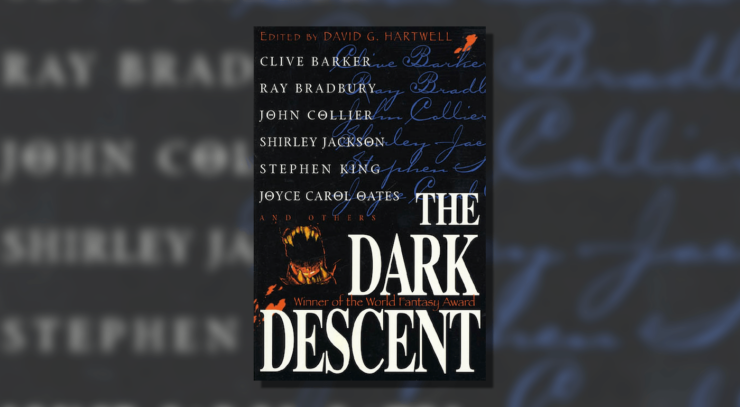Welcome back to Dissecting The Dark Descent, where we lovingly delve into the guts of David Hartwell’s seminal 1987 anthology story by story, and in the process, explore the underpinnings of a genre we all love. For an in-depth introduction, here’s the intro post.I hope you enjoyed the holidays, and it’s lovely to have you all back in the dissection room with me. Without further ado:
Robert Aickman is a name that carries weight among fans of short stories. A master of a darkly absurd style of story he insisted be called “strange stories” rather than “horror,” he used his knowledge of the supernatural (he was involved with The Ghost Club and once investigated the infamous Borley Rectory), intense verbal dexterity, and a gift for creating eccentric characters and situations to carve out a unique path through the horror landscape. “Larger Than Oneself” sees Aickman at his strangest, throwing an everywoman named Mrs. Iblis into the path of a barely legitimate symposium on religion and letting the situation evolve from satire to absurdist horror before ending in darkly comic irony. In the process, he takes dead aim at people of privilege who believe they can assuage their conscience or find something beyond their empty lives by performing belief in something greater than themselves.
During a thunderstorm, newspaper magnate and amateur theologian Vincent Coner brings together a large group of clergy, spiritualists, philosophers, and academics for a forum at his country home of Bunhill to discuss spiritual issues and in his words “achieve a synthesis.” The Forum is meant as a free-floating open conversation about God and things beyond human understanding but is more an excuse for a wild party where people yell at each other about religion and politics. Amid all this chaos, Mrs. Iblis and Mr. Stillman arrive on the front steps of Coner’s house with a young woman named Ruth (that Coner seems involved with); Iblis and Stillman seem to be invitees who weren’t told their original plans were postponed so Coner could have the Forum. As the night draws on and the Forum gets wilder, odd events pile up and the atmosphere grows more sinister, only for a strange encounter to finally settle things and achieve the synthesis Comer so desperately desires.
The unshakable feeling that things are wrong with the Forum is a constant presence throughout “Larger Than Oneself.” The feeling isn’t simply that one thing is wrong, or that there’s an intrusion of the unnatural, but that everything is at best unsettling for the protagonist—disorienting and surreal in the first part, and then deeply sinister and bizarre as the evening moves forward. Even the environment is warped, with a ghastly cartoon of the Crucifixion featured prominently and the faulty lighting of Bunhill casting scenes in an unnerving pallor. It’s a feeling of wrongness so intense that it’s existential, only underscoring a further sense of disorienting alienation as Mrs. Iblis is forced into bizarre and unwanted social interactions with the Forum. Aickman details every introvert’s worst nightmare: turning up in someplace you weren’t really invited to, being unable to leave, and having to navigate social interactions you don’t want to have while dealing with a disappointing catering spread.
Further enhancing this, it’s clear that the Forum and the Coners view their situation as completely normal. Contextually, it’s beyond bizarre. That context is everything—as the Forum goes through their various performances, the encounters get more disorienting and sinister. Mrs. Iblis is accosted by various theologians and cult leaders, drugged by Mrs. Coner and her head servant Mavis, creeped out by the advances of a drunken Vincent Coner, and finally ends the story witnessing something that “nearly ends her” and escaping out the back window into the woods as the rest of the house merely goes about their evening. The way Stillman and the Coners’ head servant Mavis seem to shrug off their glimpse of something toweringly vast and terrifying absorbing a mass of humans as if they’re watching fireworks from the roof is treated as equally absurd and unnerving, as is the house’s on-call hygiene/dietary advisor Sister Nuper coming back with her flock of young men after some kind of strenuous physical activity in the woods. It’s an interplay between those used to privilege and Mrs. Iblis, who doesn’t have the context to see whole episode as anything but an absurd and disorienting whirl of events.
This unsettlement has a purpose in its vicious irony. The Forum are people of privilege jockeying for attention and social status while eating Coner’s catered buffet. Even the most altruistic of the houseguests are privileged, performative, and self-centered—Sister Nuper mixes her nurse’s uniform with high heels and eveningwear and gives a thinly veiled interview on a grand piano to a bunch of young men more interested in her looks than in any theology, and a Canadian newspaperman seems more interested in engagement figures than actual spiritual enlightenment, despite talking at great length about how every paper in his massive conglomerate caters to the spiritual. When Mrs. Iblis comes down in the evening to find the remains of the party, the guests have even dropped their religious fervor and performative tendencies and are chatting to each other calmly about social matters and politics while raiding Bunhill’s pantry.
It makes the climax of the story—a moment of religious transcendence echoing the Forum’s absurd horror that Mrs. Iblis watches from the top of the mansion—all that more beautifully evil a twist. Everyone gets what they want in the worst way possible: Coner gets his synthesis when the Forum he assembled are all absorbed into a towering, vast figure of light and vanish, leaving him sobbing unanswered prayers to give him something larger than himself. The various hucksters who spend all day arguing spiritual matters are finally in touch with the divine and spiritual, absorbed into a horrifying cosmic entity, their fates ambiguous but awful. And even Mrs. Iblis finally gets to leave, packing up and sneaking out the back window utterly horrified at all she’d seen, as the remaining guests shrug indifferently and head to bed.
It’s a gleefully acerbic strike at those who perform their beliefs and good actions for personal gain—after all, it’s no accident that those left untouched by the divine presence are those who weren’t actively seeking or exploiting the divine in the first place. Nor is it any accident that Aickman ends on dark physical comedy, with the Forum blindly filing out the door only to squish against the outer wall of Bunhill before they’re “merged” and Mrs. Iblis sneaking out the back window to run off into the woods—the entire thing is as absurd and silly as the performative conniptions of the Forum itself.
In Aickman’s eyes, those who seek absolution or something greater than themselves solely for personal gain are doomed to their own existential hell. Mr. Stillman even says so just before the climax, delivering a monologue on how taming the human mind is more important than searching for meaning outside of it. The sinister satire of Bunhill only illustrates that, with the absurd horror of the climax perfectly matching the absurd horror of the privileged inhabitants. In the end, the one rational person in possession of her own faculties is also the only one to understand the horror and escape. It’s an epiphany that, unlike the surviving guests at the end of the story, the reader shouldn’t ignore.
***
And now to throw it over to you. Apart from the obvious question of favorite Robert Aickman story, in honor of his brushes with the supernatural, have any of you had any of your own encounters with ghosts or otherworldly phenomena? Or wound up at any weird parties where you were out of your depth? I’m interested to hear if you have and please share your stories (or as much as you’re comfortable with) below!
Please join us next week for Fritz Leiber’s “Belsen Express,” and once again, it’s lovely to be back.
Sam Reader is a literary critic and book reviewer currently haunting the northeast United States. Apart from here at Tor.com, their writing can be found archived at The Barnes and Noble Science Fiction and Fantasy Book Blog and Tor Nightfire, and live at Ginger Nuts of Horror, GamerJournalist, and their personal site, strangelibrary.com. In their spare time, they drink way too much coffee, hoard secondhand books, and try not to upset people too much.










